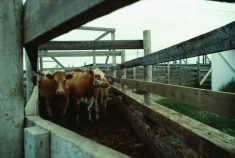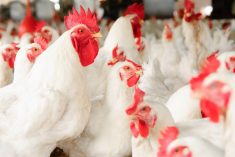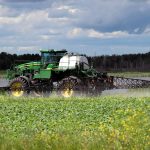The organic industry is mounting a protest against pending changes for its Organic Products Regulation (OPR) that it says has potential to “undo the entire Canadian organic supply chain.”
In 2012, the passage of the Safe Foods for Canadians Act resulted in a number of regulations, including the OPR, being combined into a single document called the Safe Foods for Canadians Regulation.
Organic advocates say the move will turn the Organic Product Regulations into “just another set of clauses in a massive food safety regulation” and result in needless and confusing requirements for the sector.
Read Also

Trump tariff on Brazilian goods could jack up U.S. burger price
U.S. President Donald Trump’s plan for a 50 per cent tariff on goods from Brazil will likely raise prices for the beef that is used in American hamburgers, traders and analysts said on Thursday, as food manufacturers increasingly rely on imports during a time of declining domestic production.
In 2012, the passage of the Safe Foods for Canadians Act resulted in a number of regulations — including the Canadian Agricultural Products Act, the Fish Inspection Act, the Meat Inspection Act, and the food-related provisions of the Consumer Packaging and Labelling Regulations — being combined into a single document called the Safe Foods for Canadians Regulation.
The move codifies the OPR as Part 14 of that regulation. The industry agues the OPR is not a food safety regulation and therefore doesn’t belong there.
Canadian Organic Growers and the Organic Federation of Canada plus other industry groups voiced their related concerns about it during a public comment period which ended April 21.
One of the main issues is that housing OPR in food safety regulation would restrict organic commodities permissible for certification to food, livestock feed, aquaculture and seed. That would mean being unable to realize what are otherwise sizable market opportunities for non-food products such as organic textiles, pet food, Natural Health Products, body care and marijuana, the COG asserted in a recent release.
The sector is also unprepared to comply with new rules that would mean transporting and storing organic goods be certified, it said. Activities such as slaughtering, transportation and storage of organic products will now require organic certification, overriding the current system of attestations of compliance.
It would mean, for example, organically raised cattle could not be transported on the same trucks as commercial non-organic cattle. These requirements are needless, sector officials say.
“Our organic supply chain is not prepared for these dramatic changes and they are not necessary in maintaining organic integrity,” the COG stated in its release.
As well, organic certificates would have a 12-month expiry date even if the activity and product remains compliant with the Canadian Organic Standards and the operator was in the process of renewing their certificate. A related concern is that this will create confusion when products bearing an organic claim remain on store shelves beyond the expiry of their certificates.
Another concern is organic certificates will now need to declare the exact organic content percentage of multi-ingredient products on the organic certificate.
“This is not a realistic expectation,” the COG asserted in a release last week, noting that the percentage of organic contents may vary depending on the availability of organic ingredients at the time of processing. It wants the current system of categorizing the product as either organic (95 per cent or more) or 70-95 per cent organic content should be maintained.
The OPR was established in 2009 through an industry-government partnership. It is enforced by the Canadian Food Inspection Agency (CFIA).




















